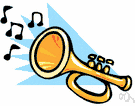bugle
Also found in: Thesaurus, Medical, Encyclopedia, Wikipedia.
bu·gle 1
(byo͞o′gəl)n.
1. Music A brass instrument somewhat shorter than a trumpet and lacking keys or valves.
2. The loud resonant call of an animal, especially a male elk during rutting season.
intr.v. bu·gled, bu·gling, bu·gles
1. Music To sound a bugle.
2. To produce a loud resonant call, as of a rutting male elk.
[Middle English, wild ox, hunting horn made from the horn of a wild ox, from Old French, steer, from Latin būculus, diminutive of bōs, ox; see gwou- in Indo-European roots.]
bu′gler n.
bu·gle 2
(byo͞o′gəl)n.
A tubular glass or plastic bead that is used to trim clothing.
[Origin unknown.]
bu·gle 3
(byo͞o′gəl)n.
Any of several creeping Old World herbs of the genus Ajuga in the mint family, having opposite leaves, square stems, and terminal spikes of purplish to white flowers. Also called bugleweed.
[Middle English, from Old French, from Late Latin būgula (perhaps influenced by būglōssa, bugloss), from Latin būgillō.]
American Heritage® Dictionary of the English Language, Fifth Edition. Copyright © 2016 by Houghton Mifflin Harcourt Publishing Company. Published by Houghton Mifflin Harcourt Publishing Company. All rights reserved.
bugle
(ˈbjuːɡəl)n
(Instruments) music a brass instrument similar to the cornet but usually without valves: used for military fanfares, signal calls, etc
vb
(Music, other) (intr) to play or sound (on) a bugle
[C14: short for bugle horn ox horn (musical instrument), from Old French bugle, from Latin būculus young bullock, from bōs ox]
ˈbugler n
bugle
(ˈbjuːɡəl)n
(Plants) any of several Eurasian plants of the genus Ajuga, esp A. reptans, having small blue or white flowers: family Lamiaceae (labiates). Also called: bugleweed See also ground pine
[C13: from Late Latin bugula, of uncertain origin]
bugle
(ˈbjuːɡəl)n
(Crafts) a tubular glass or plastic bead sewn onto clothes for decoration
[C16: of unknown origin]
Collins English Dictionary – Complete and Unabridged, 12th Edition 2014 © HarperCollins Publishers 1991, 1994, 1998, 2000, 2003, 2006, 2007, 2009, 2011, 2014
bu•gle1
(ˈbyu gəl)n., v. -gled, -gling. n.
1. a brass wind instrument resembling a cornet but usu. without keys or valves, used typically for sounding military signals.
v.i. 2. to sound a bugle.
3. (of bull elks) to utter a rutting call.
[1250–1300; Middle English bugle (horn) instrument made of an ox horn < Anglo-French, Old French < Latin būculus bullock, young ox =bū- variant s. of bōs ox + -culus -cle1]
bu′gler, n.
bu•gle2
(ˈbyu gəl)n.
any of various low-growing plants belonging to the genus Ajuga, of the mint family, usu. having blue flowers.
[1225–75; Middle English < Old French < Medieval Latin bugula a kind of plant]
bu•gle3
(ˈbyu gəl)n.
Also called bu′gle bead`. a tubular glass bead used for ornamenting dresses.
[1570–80; of obscure orig.]
Random House Kernerman Webster's College Dictionary, © 2010 K Dictionaries Ltd. Copyright 2005, 1997, 1991 by Random House, Inc. All rights reserved.
bugle
- Originally the word for ox, whose horn was used to give signals, it came to mean such a musical instrument.See also related terms for horn.
Farlex Trivia Dictionary. © 2012 Farlex, Inc. All rights reserved.
bugle
Past participle: bugled
Gerund: bugling
| Imperative |
|---|
| bugle |
| bugle |
Collins English Verb Tables © HarperCollins Publishers 2011
ThesaurusAntonymsRelated WordsSynonymsLegend:
Switch to new thesaurus
| Noun | 1. |  bugle - a brass instrument without valves; used for military calls and fanfares bugle - a brass instrument without valves; used for military calls and fanfaresbrass instrument, brass - a wind instrument that consists of a brass tube (usually of variable length) that is blown by means of a cup-shaped or funnel-shaped mouthpiece |
| 2. | bugle - any of various low-growing annual or perennial evergreen herbs native to Eurasia; used for ground cover herb, herbaceous plant - a plant lacking a permanent woody stem; many are flowering garden plants or potherbs; some having medicinal properties; some are pests Ajuga, genus Ajuga - bugle Ajuga reptans, creeping bugle - low rhizomatous European carpeting plant having spikes of blue flowers; naturalized in parts of United States Ajuga genevensis, blue bugle, erect bugle - upright rhizomatous perennial with bright blue flowers; southern Europe Ajuga pyramidalis, pyramid bugle - European evergreen carpeting perennial Ajuga chamaepitys, yellow bugle, ground pine - low-growing annual with yellow flowers dotted red; faintly aromatic of pine resin; Europe, British Isles and North Africa | |
| 3. | bugle - a tubular glass or plastic bead sewn onto clothing for decoration bead - a small ball with a hole through the middle | |
| Verb | 1. | bugle - play on a bugle music - musical activity (singing or whistling etc.); "his music was his central interest" |
Based on WordNet 3.0, Farlex clipart collection. © 2003-2012 Princeton University, Farlex Inc.
Translations
بوق
trubka
signalhorn
lúîur
シソラッパ
trimitastrimitininkas
taure
poľnica
Collins Spanish Dictionary - Complete and Unabridged 8th Edition 2005 © William Collins Sons & Co. Ltd. 1971, 1988 © HarperCollins Publishers 1992, 1993, 1996, 1997, 2000, 2003, 2005
Collins English/French Electronic Resource. © HarperCollins Publishers 2005
bugle
Collins German Dictionary – Complete and Unabridged 7th Edition 2005. © William Collins Sons & Co. Ltd. 1980 © HarperCollins Publishers 1991, 1997, 1999, 2004, 2005, 2007
Collins Italian Dictionary 1st Edition © HarperCollins Publishers 1995
bugle
(ˈbjuːgl) noun a musical wind instrument usually made of brass, used chiefly for military signals. He plays the bugle.
ˈbugler nounKernerman English Multilingual Dictionary © 2006-2013 K Dictionaries Ltd.